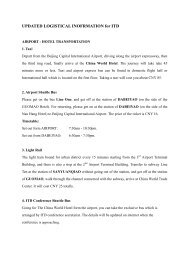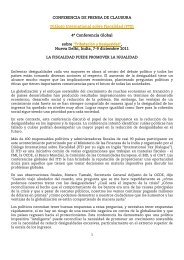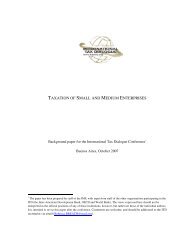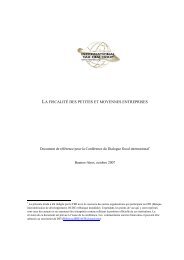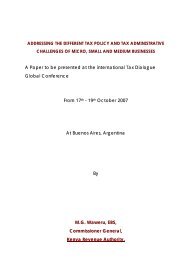Arcotia Hatsidimitris - International Tax Dialogue
Arcotia Hatsidimitris - International Tax Dialogue
Arcotia Hatsidimitris - International Tax Dialogue
You also want an ePaper? Increase the reach of your titles
YUMPU automatically turns print PDFs into web optimized ePapers that Google loves.
4. GOVERNANCE ARRANGEMENTS – 39<br />
Box 6. Transfer Pricing Governance Arrangements in the UK<br />
• HMRC introduced a new governance system for transfer pricing enquiries with effect from 1 April 2008.<br />
• The primary aims of introduction of the new system were to achieve:<br />
– more focused case selection through effective risk assessment,<br />
– faster and more effective working of cases, and<br />
– greater consistency in how cases are worked and in decision making.<br />
• The three stages of HMRC’s mandatory TP Governance are:<br />
– making sure the selection of a case is appropriate,<br />
– ensuring there is effective progress in a case, and<br />
– reaching the appropriate conclusion in a case<br />
• A business case must be made by the relevant case team to HMRC’s Transfer Pricing Panel or Board<br />
for approval prior to an enquiry being commenced. The business case must detail the extent of risk<br />
assessment undertaken and the conclusions drawn.<br />
• Regular reviews are required to ensure that cases are actively progressed and any factors causing<br />
delay are tackled.<br />
• Finally prior approval is required from the Transfer Pricing Panel or Board of any settlement proposals,<br />
before they are agreed with the taxpayer, or for a decision to litigate.<br />
Central oversight of all its transfer pricing cases in this way allows HMRC to closely monitor its own<br />
performance and obtain robust management information<br />
When cases become stalled, good governance ensures that managers are aware of this and can<br />
intervene. It is often easier for them to reach the conclusion that a case does not merit further pursuit,<br />
or should be narrowed in its scope, than it is for the audit or enquiry team itself to make the decision.<br />
Internal appeals processes can also be of value when the process of enquiry, or more usually<br />
negotiation, about any adjustment that is being suggested has ceased to progress. Further consideration<br />
of ways in which tax administrations are able to tackle delay is covered in more detail in Chapter 5.<br />
Project management – a transfer pricing audit or enquiry plan<br />
Governance arrangements of the sort described above usually include the requirement for a<br />
project plan to be agreed at the outset of an audit or enquiry and also help to ensure adherence to such<br />
a plan.<br />
For example, in HMRC it is mandatory to have an action plan, although the exact nature of the<br />
plan will vary according to the circumstances of the case. Where the issues are straightforward and<br />
fact-finding and analysis limited, a simple plan may suffice. By contrast, in a complex case where<br />
there are several different strands of enquiry moving at different paces, with different team members<br />
or specialists involved, a more detailed plan will be needed.<br />
Whatever the size of the case, however, key features of an effective audit or enquiry plan will<br />
often include:<br />
• Initial scope of the audit or enquiry<br />
DEALING EFFECTIVELY WITH THE CHALLENGES OF TRANSFER PRICING © OECD 2012





